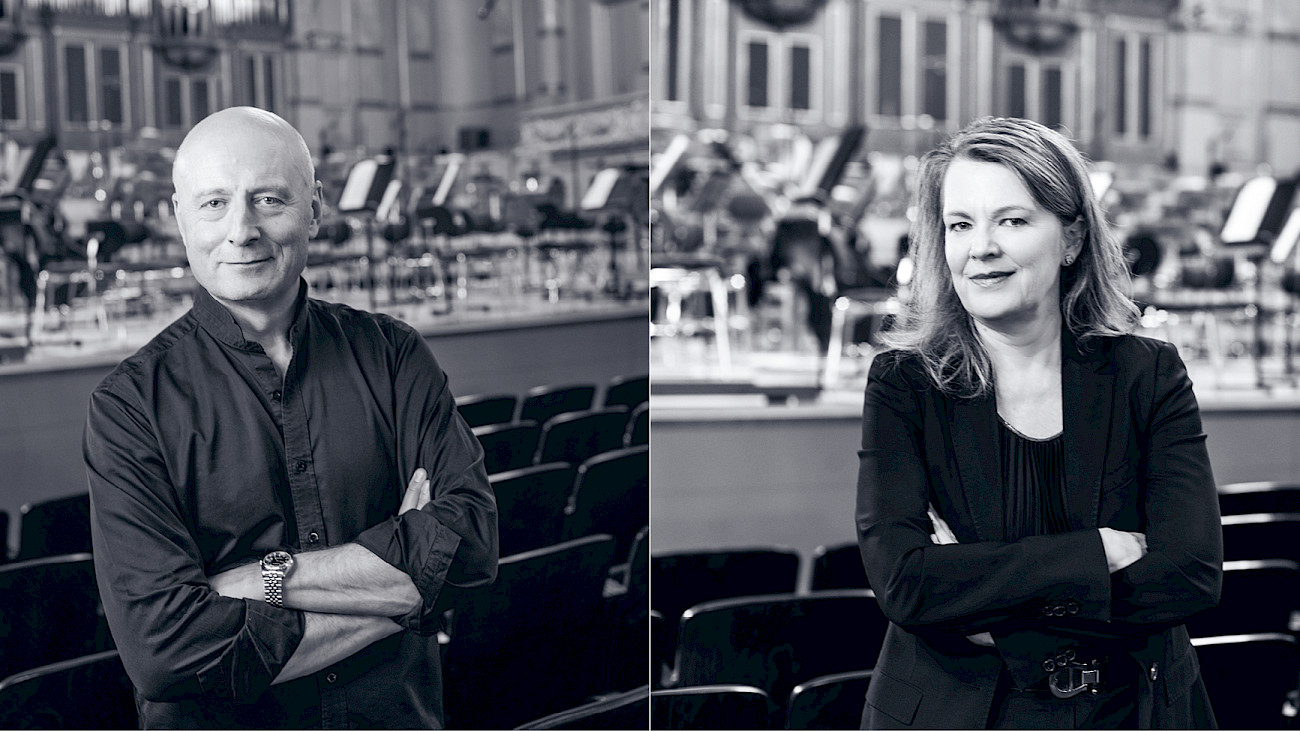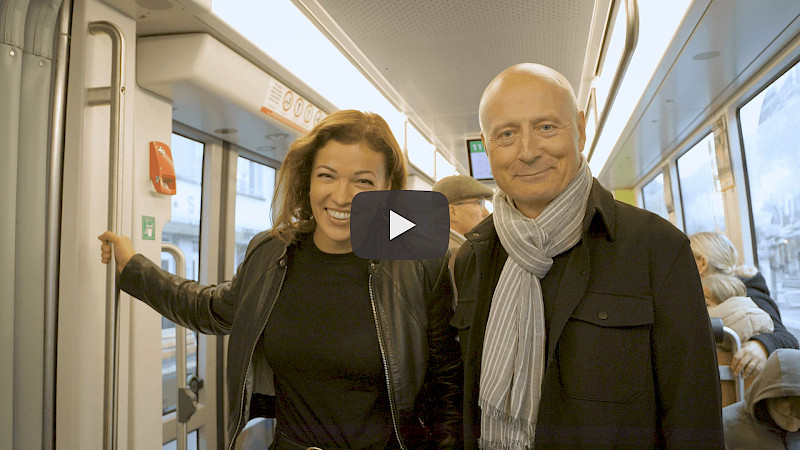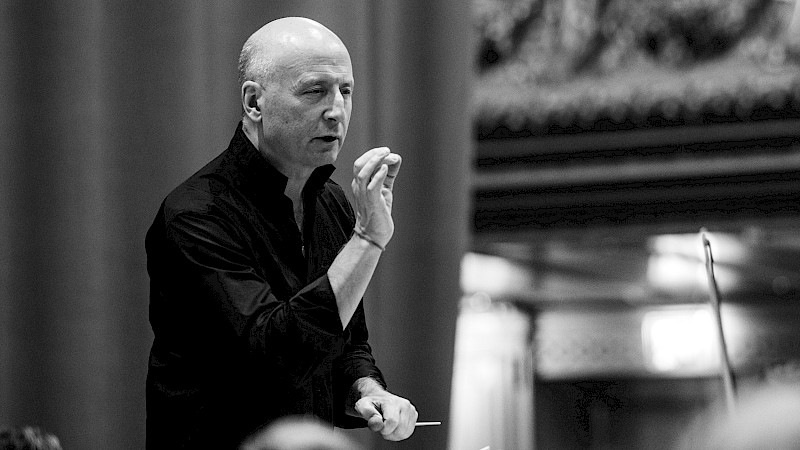
The course of the world and musical realities
Which direction is the musical compass pointing in 2024/25? Music Director Paavo Järvi and Artistic Director Ilona Schmiel talk about the less obvious from the north, new territory by John Adams and the open air, as well as masterpieces by Mahler and Shostakovich.
With the season programme, we have the map for our journey in the 2024/25 season in front of us. Where are we going?
IS We're travelling virtually to Iceland. That's an important focus this year, as it's the home of our Creative Chair Anna Thorvaldsdottir, among others. She was born in Reykjavik. And Víkingur Ólafsson, one of our focus artists. We also have conductor Eva Ollikainen as a guest. She is making her debut with us - and otherwise conducts the Iceland Symphony Orchestra and has also premiered pieces by Anna Thorvaldsdottir. We were also able to include family concerts with her music in the programme: "Thorstein and the Giants". So Iceland is also a theme here - as well as in "Literature and Music" and in our chamber music lunch concerts.
Paavo, what do you associate musically with Iceland?
PJ Iceland is a very, very important country for Estonia, my home country. It was the very first country to recognise Estonian independence after the collapse of the Soviet Union. We even have an "Iceland Square" in Estonia, in Tallinn ("Islandi väljak"). And we are very connected because it is - which is hardly possible - an even smaller country than Estonia. But it is a country with a fantastic culture, especially a great music culture. I've been to Iceland a few times, and I have very fond memories of musical encounters with the Iceland Symphony Orchestra and Leif Ove Andsnes as a soloist. And when it comes to Icelandic composers, their reputation precedes them. Iceland really is known worldwide for its outstanding composers.
Let's stay with Anna Thorvaldsdottir for a while. She will be Creative Chair next season. What kind of musical personality can we expect, Ilona?
IS She is someone who is very intensely dedicated to all the processes taking place in the world right now. Nature, to which she turns very consciously, plays an important role. But you always get the feeling that she scrutinises the big issues, the big developments. Take, for example, the first piece that our audience will discover, "Archora". The ancient Greek title is made up of "archē" for the primordial beginning and "chora" for space - so it really is about the whole world. The course of the world is set in motion. And this is exactly what is recognisable in the score - an intensive development process over 18 minutes. She writes very clearly what she means. There is a clear process of transformation in the sounds. Nevertheless, she gives all the musicians a certain freedom, including Paavo as conductor. For me, there is something very touching about her music. And I think our musicians will also enjoy playing this music.
Do you already know her music, Paavo?
PJ It will be the first time I conduct her music. But her music is widely known and performed by many different people and orchestras. And for me, a musician from the North who listens to a lot of music from the Nordic countries, also from Finland and Sweden and Norway and Estonia, there is a kind of familiar vibe. A Nordic mood.
Can you name some aspects that are Nordic for you?
PJ It's difficult to put into words exactly what these things are. For example, when I listen to modern Estonian music, by Erkki-Sven Tüür for example, it sounds a bit Estonian to me. I can't say exactly why. But it does. And maybe it's not ... It's not the techniques that are different from those of other composers. I mean, most contemporary composers have a certain vocabulary of techniques that they all use, albeit with some variations.
Is it something to do with atmosphere?
PJ Exactly. And it's about the context of these techniques, of certain sounds. There is often a preference for a certain type of sound. That's something very subjective. Some things remind us of a kind of nature sound, but they are not very direct. I'm not talking about birdsong or anything too obvious. It's a kind of general feeling and sound that you get from the Nordic nature. In the case of Anna Thorvaldsdottir, I find it very interesting that she achieves a sound that sometimes seems like an electronic sound, but she doesn't use it. She really just uses the instruments of the orchestra, and she also has these moments where you're not quite sure how it works, how it's done. Fascinating!
He knows the world. And somehow I can't help but see him as an interpreter who fits perfectly into his time.
We've already mentioned Víkingur Ólafsson. What is his most important character trait, both personally and in terms of music, Ilona?
IS I would say that he loves to go very deep into the music. He already showed that in the 2023/24 season in front of a sold-out hall: he played the "Goldberg Variations" and it's amazing what he does with Bach. On the other hand, he is also very open: And so he is now playing the Swiss premiere of the new piano concerto by John Adams - our Creative Chair for the 2021/22 season - with us. Shortly beforehand, he will play the world premiere in the USA. And that's also typical of Víkingur: he doesn't do things by halves. When he does something, he is really involved and shows his own perspective.
How do you perceive him, Paavo?
PJ I've played music with him quite often as a soloist: we've not only performed modern music, but also Mozart and other works from the classical repertoire. And I find it remarkable that he has a very special, interesting approach to every piece of music. He is a very original musician, a very intelligent person. He knows the world. And somehow I can't help but see him as a performer who belongs in his time, who fits perfectly into his time. He is a good combination of someone who has studied the repertoire in depth and a 21st century person. The way he presents himself, the way he presents the projects. All these combinations of interesting and narrative elements in his CDs, or the way he brings together classical and new repertoire in concerts. So he's a kind of perfect soloist for our time.
We are co-commissioners of Adams' piano concerto "After the Fall". What is special about this commission?
IS As co-commissioners, we bring a new piece to certain places. And this time we have a very special situation in that we are even going on tour with Víkingur Ólafsson. We're first presenting the Swiss premiere in Zurich in January, and then in March we're travelling on to the Elbphilharmonie in Hamburg for the German premiere of this piece. And a few days later, we will perform the French premiere in Paris. This also gives us the chance to perform it together more often in order to delve deeper into a new piece like this. It's also important for the orchestra. I like this idea, because the more precisely you perform Adams' music, the more you discover. And for us, it's a journey with a composer we really like.
How would you describe the connection with John Adams - even after you've worked together here in Zurich, Paavo?
PJ I have to say that the experience of working with John Adams, meeting him, having him here during our recording sessions and really knowing him as a strong supporter and ally of the orchestra has changed me. The way I look at him and the way I listen to his music. He has always been an important composer for me. But I was very touched by the fact that he was so involved with the orchestra and the whole recording process. He conducted the Tonhalle-Orchester Zürich and was very impressed by this orchestra. Personal motivation comes from personal contact and personal interaction with the musicians you work with, especially with a giant like John Adams. Having all this in mind and being aware of this connection naturally motivates us even more to work really well on his music. With a season's worth of additional enthusiasm for these first performances. All people need human motivation, and personal contact with someone like John Adams makes a big, really big difference.
We have a second focus artist this season, Golda Schultz. Paavo, you will be performing Strauss' "Four Last Songs" with her ...
PJ Golda is wonderful. Absolutely marvellous on every level. She's a fantastic singer and a wonderful person - and we've been friends for a long time. We really have known each other for a long time.
Do you remember the first time you met?
PJ She was Marcelline in our "Fidelio" with the Deutsche Kammerphilharmonie Bremen when we also performed the opera in Japan. That was in 2013, and from then on we became very good friends. And since then, she has developed from a relatively unknown young singer into a real world star, with great success at the Metropolitan Opera in New York and in many other places around the world. She simply has a wonderful voice and musicality - and is a great overall package.
Where did you hear her for the first time, Ilona?
IS I've known her since 2015, when she sang Sophie in "Der Rosenkavalier" in Salzburg, and I was really impressed. Completely overwhelmed. She outshone everything. With her beautiful voice, but also with her personality. And now with Strauss, "Vier letzte Lieder", that's a "match". A perfect match!
Then, of course, Mahler is an important topic. We are continuing our Mahler cycle with Symphonies No. 1 and No. 7. Why these two in particular, Paavo?
PJ We discussed how we could best structure this long cycle. The First and Seventh are suitable as a continuation after the Fifth because they come from very different periods of his life and artistic work. So we really have two different models: the young Mahler and the late Mahler, who becomes incredibly complex, darker and more philosophical after the Fifth. I think that's a good contrast. We also take these works with us on tour, so that we grow ever closer to the work - right up to the CD recording in Zurich.
IS We will be playing Mahler's First at the Lucerne Festival before our season opens. And this is a very important opportunity for us to show that we have now started the Mahler cycle in the 2023/24 season, to show all the new facets and colours of the orchestra. Even after Paavo's wonderful debut with the Lucerne Festival Orchestra in 2023 - that was also with Mahler, with the Third Symphony. And we're taking the Symphony No. 7 with us to Spain this season. We haven't been there with Paavo yet. That will be a great premiere.
There will also be a premiere with Paavo in Zurich - and this time not at the Tonhalle.
IS Yes, at tonhalleAIR in the Münsterhof, in the heart of Zurich. It's an open-air concert weekend. And the two may even be connected. Because the success we achieve on international tours, the visibility in the scene, the highly acclaimed concerts in the Tonhalle - we want to share all of this; we want to give something back to our audience. That's why we want to organise tonhalleAIR every two years starting this season - as a big music festival over two days. What unites us is the joy of music. And we mean it. Because we are the hosts and are also giving an evening concert with Jean-Yves Thibaudet. At other concerts, however, we play side-by-side with the Zurich Jazz Orchestra or our Junior Music Partner JSOZ. The youngest members of the audience will also be able to enjoy the extensive Superar Suisse programme and sing together. We are hoping for a wonderful, sonorous summer festival. But in the end, it shows above all that we are all in the same boat and that the great joy of music is the most beautiful goal we can share here.
Shostakovich's works deal with the human spirit, with suffering, with triumph over it and with unexpected beauty. The music describes exactly the situation we are experiencing in the world right now. Right now.
Paavo, what can tonhalleAIR do that other concerts can't?
PJ First of all, it's accessible to everyone. It takes place in a place where everyone can hear it. There are no restrictions. Of course, it's not such a big problem to get into a concert hall. But there are people, and not so few, who are a little unsure. And they ask themselves lots of questions about what they should wear, how they should behave and what they should do. Out in the open, it's completely open, equal. There are no barriers. There are no, or rather, different traditions or expectations. It's simply music for everyone! And I think that's a big plus. It's something that people can listen to from a distance. They don't have to be in the neighbourhood. But of course we're also happy if they want to be close to us.
What about our debuts in the Tonhalle, Ilona?
IS Yes, there are a lot of premieres on stage. And I'm starting with the youngest in the series, in our Série jeunes: There will be a wonderful harpist, Tjasha Gafner. She is Swiss, and I think it is precisely with this instrument that it is so difficult to enter our market - I am really looking forward to it. Another name is Vivi Vassileva. When Martin Grubinger ended his career on stage as a solo percussionist, I asked him who would follow. And he said to me: "Before I leave the stage, you have to promise to watch Vivi." Vivi and I met in April 2023 and I was immediately convinced that she could take on a very special role as a percussionist in the music world.
And with the Tonhalle-Orchester Zürich?
IS I've already mentioned Eva Ollikainen, but Nathalie Stutzmann will also be making her debut with us. Petr Popelka is coming together with Antoine Tamestit. Tugan Sokhiev makes a late debut - which I almost couldn't believe. André de Ridder is also finally conducting with us for the first time - contemporary music with SONIC MATTER, including "Metamorphosis" by Anna Thorvaldsdottir.
There will be another special reunion among the conductors this season - namely with all four of Paavo's Assistant Conductors since we introduced this position in 2019.
IS This is actually something that we both, Paavo and I, support and follow together: the development of our assistant conductors. And when we invite them to the Orpheum concert, in this case Holly Choe, that's exactly what we're doing. Izabelė Jankauskaitė and Felix Mildenberger are also returning to us for the family concerts. And Margarita Balanas, Assistant Conductor since 2023/24, will conduct a piece by Anna Thorvaldsdottir in a family concert. So that's something we control very consciously. We try to accompany them in this way and also encourage their next steps.
PJ That is also very close to my heart.
There is also a composer who is very close to your heart, Paavo Shostakovich. The cello concerto and symphonies no. 6 and 10 are on the programme. Why does his music seem so contemporary, so immediate?
PJ Apart from the fact that he is probably one of the greatest composers of the 20th century, or of music history in general ... Of course, I have a special connection to his music because I got to know him. He used to come to Pärnu, where I have my summer festival today. He was a very close friend of my parents. Shostakovich was someone who wrote about the realities, the realities of his time - in his particular geographical location, the Soviet Union. He experienced - and documented - the brutality of the mental and physical terror that was commonplace in Stalin's Soviet Union. And that is something that is now being repeated. And so the music could have been written about the kind of dictator who keeps the world and the people in his own country under incredible fear and brutally murders millions of them. The interesting thing is that, paradoxically, it is narrated by a Russian composer. He was one of those who left us the legacy to remember the horrors of that time forever. And the music of Shostakovich is a great example of this. These works are about the human spirit, about suffering, about triumph over it and about unexpected beauty. People still find ways to exist, to make music, to love and to raise their children - to hope for something beautiful and meaningful, for a little light. So Shostakovich's music describes exactly the situation we are experiencing in the world right now. Right now.
IS That's why we decided to realise a two-part string quartet cycle with all 15 of his wonderful string quartets in the Shostakovich year. That is a legacy in itself. Long before the additional global political postponements, it was already clear that the Jerusalem Quartet would play this entire cycle this season and next. But the truth in these masterpieces is something that is so human. And yes, there is something very touching about it, especially now. Perhaps even more so than a few years ago.
Translated with DeepL.com





